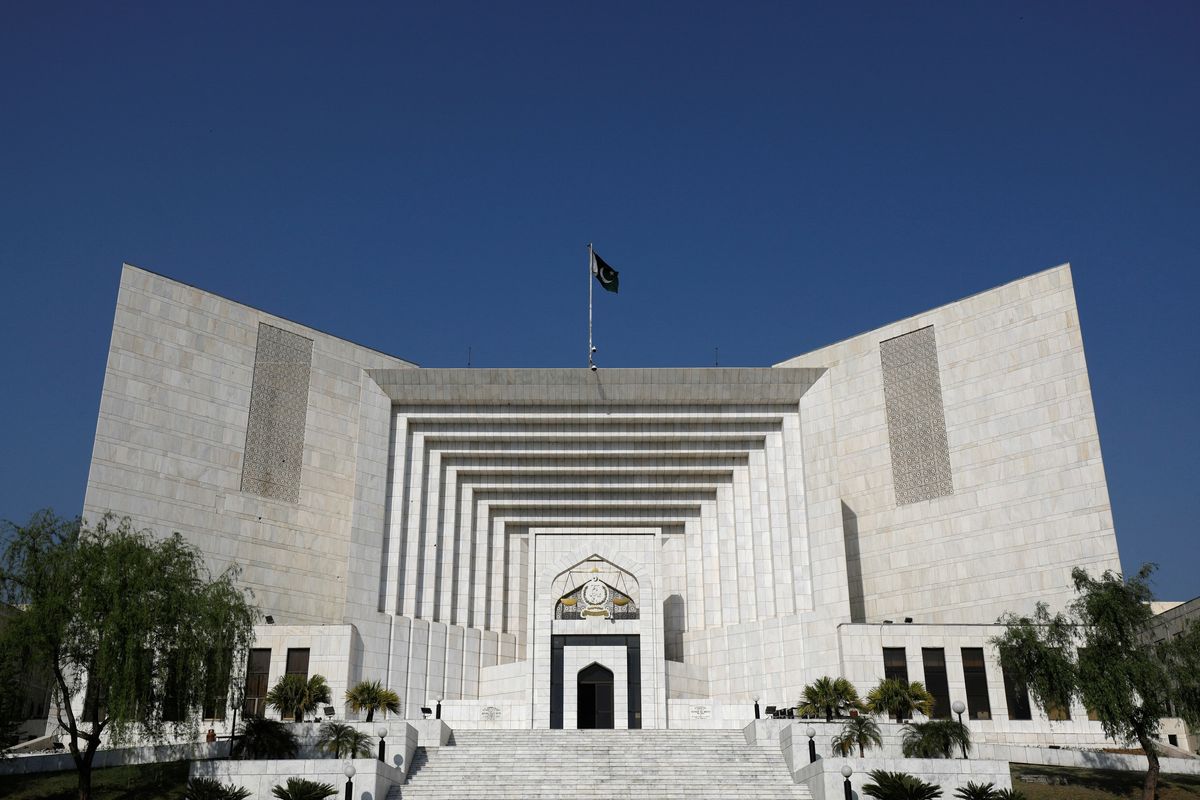Pakistan’s top court questions difference between APS attack and May 9 protests
Supreme Court judge asks why May 9 protesters are being treated differently from terrorists who attacked APS

Aamir Abbasi
Editor, Islamabad
Aamir; a journalist with 15 years of experience, working in Newspaper, TV and Digital Media. Worked in Field, covered Big Legal Constitutional and Political Events in Pakistan since 2009 with Pakistan’s Top Media Organizations. Graduate of Quaid I Azam University Islamabad.

Justice Musarrat Hilali of the Supreme Court’s constitutional bench questioned the distinction between the tragic 2014 Army Public School (APS) attack and the May 9, 2023, protests during a hearing on an intra-court appeal against military trials of civilians.
The violence on May 9, 2023, erupted after the brief detention of former prime minister Imran Khan on graft charges. Individuals carrying Pakistan Tehreek-e-Insaf (PTI) flags vandalized government buildings and military installations, including setting fire to the official residence of a senior Pakistani general.
PTI has denied any role in the unrest, insisting that neither its leaders nor supporters orchestrated the riots. The party has also condemned a sweeping state crackdown, which it claims is politically motivated and aimed at dismantling the PTI.
Last month, Khan and several PTI leaders were formally charged in connection with the attack on Pakistan’s military headquarters (GHQ).
A seven-member constitutional bench, led by Justice Aminuddin Khan, heard arguments from attorney Khawaja Ahmad Hussain, who represented former Chief Justice Jawad S. Khawaja.
Hussain argued that ordinary civilians do not fall under the jurisdiction of the Army Act, which applies only to civil employees of the Pakistan Armed Forces.
Justice Hasan Rizvi inquired whether the Army Act applies to attacks on airbases. Justice Hilali remarked that while the APS attack was a terrorist act, the May 9 events were a protest. She questioned why civilians involved in both incidents were treated differently.
Military trials and fair justice
Hussain contended that May 9 suspects should face trial but not in military courts. Justice Aminuddin Khan affirmed that the judiciary has the authority to review unconstitutional legislation.
Referring to the May 9 events, Hussain questioned the fairness of military trials, citing a May 15 statement from the Inter-Services Public Relations (ISPR), the military’s media wing, that claimed undeniable evidence of the protests. He argued that an affected party cannot ensure a fair trial.
Justice Aminuddin Khan referenced the Indian spy Kulbhushan Jadhav's case, stating that the Pakistan Armed Forces were not the sole affected party in that instance. Justice Muhammad Ali Mazhar added that striking down Section 2(1)(d)(ii) of the Army Act would impact cases like Jadhav’s.
When asked where a future foreign spy would be tried, Hussain suggested the Anti-Terrorism Court. Justice Rizvi, smiling, responded, “Oh, really?”
Legal precedents and military trials
Justice Mazhar questioned whether the Pakistan Army could invoke Section 2(1)(d)(ii) in the future. Hussain acknowledged that its use would be restricted. He also highlighted that a Field General Court Martial does not allow accused individuals to freely choose their lawyers.
Justice Hilali asked whether Hussain was advocating for the accused in absentia. He responded that in military courts, lawyers require the army chief’s approval, which can be denied, potentially leading to unfair convictions.
Justice Jamal Mandokhail cited past rulings upholding military court provisions, emphasizing that judicial precedents cannot be ignored. He also noted that courts frequently hear about the martyrdom of Pakistani soldiers in terrorist attacks and questioned how justice would be served to their families under the revised laws.
Challenges in the judicial system
Justice Rizvi expressed concern over civilian involvement in attacks on the armed forces. He noted that recent court rulings striking down key sections of the Army Act have created challenges in prosecuting such cases. He also pointed out delays in the civilian judicial system, where terrorism cases drag on due to repeated adjournments.
Hussain cited the Sheikh Liaqat Hussain case, arguing that civilian courts are best equipped to handle terrorism trials. Justice Rizvi countered that the case was limited to Karachi and did not reflect the nationwide threat of terrorism.
Justice Mandokhail remarked, “It is worse to punish one innocent person than to let a hundred guilty ones go free.” He stated that the judiciary’s role is to make decisions, while ultimate justice lies with God.
He shared a personal experience, revealing that he had been a victim of terrorism himself. “Our convoy of judges was passing through an area when a bomb exploded just five minutes earlier. If the attack had succeeded, six judges would have been lost,” he said.
Mandokhail emphasized that without evidence, the courts have no choice but to acquit suspects, which often leads to criticism of the judiciary. “If there is no evidence before us, we will have to acquit the accused. Then people say the judiciary is ranked at 250th place,” he noted.
Justice Rizvi added that witnesses often refuse to testify, even in murder cases. “Even if someone witnesses a murder, they do not come forward to testify,” he said, pointing to the lack of witness protection as a major hurdle in the justice system.
He further criticized delays in court proceedings, stating that in murder cases, lawyers take numerous adjournments, prolonging the trial process.
Justice Mandokhail questioned the effectiveness of the 21st Constitutional Amendment, which was introduced for a four-year period to establish special courts. “Tell us, did the 21st Amendment prove beneficial?” he asked.







Comments
See what people are discussing